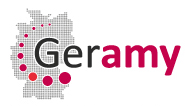GERAMY - Network for Systemic Amyloid light-Chain (AL) Amyloidosis

Systemic amyloid light-chain (AL) amyloidosis is a rare but fatal protein folding disorder. It is caused by monoclonal plasma cells in the bone marrow producing amyloidogenic light chain proteins, which accumulate in several organs. Early diagnosis is very difficult because initial symptoms are unspecific. Cause of death is usually heart failure due to excessive cardiac amyloid deposition. To date, the only evidence-based-therapy to stop the production of amyloid precursors is cytoreductive treatment of the underlying B cell clone, which is often very toxic in this group of fragile patients.
In this consortium, a controlled clinical trial will be performed to test the efficacy and safety of epigallocatechin-3-gallate (EGCG) in patients with cardiac AL amyloidosis. In parallel, the molecular basis of the disease will be investigated using genetic, biochemical, cell biological and high-resolution biophysical methods to reveal new molecular targets and to further refine diagnosis of disease. This translational, interdisciplinary approach will increase our knowledge of the pathogenesis of AL amyloidosis and enable new developments to improve diagnosis, therapy and prognosis of affected patients.
Projects- Prospektiv-randomisierte Studie zur Therapie mit EGCG vs. Placebo bei Patienten mit Herzamyloidose (PD Dr. S. Schönland, Heidelberg)
- Genomische Analyse monoklonaler Plasmazellen zur Verbesserung des Verständnisses der Amyloid-Genese und Prognose bei Leichtketten-Amyloidose (Prof. A. Jauch, Heidelberg)
- Klassifikation der systemischen Amyloidosen des Amyloid Registers Kiel mit Hilfe von Tissue-MALDI Imaging (Prof. C. Röcken, Kiel)
- Strukturelle Homogenität und Polymorphismus von AL Amyloidfibrillen (Prof. Dr. M.Fändrich, Ulm)
- MAS Festkörper-NMR Untersuchungen von Leichtketten Amyloidfibrillen und deren Wechselwirkung mit Kleinmolekülen (Prof. B. Reif, TU München)
- In-vitro Untersuchung zur sequenzspezifischen Therapie (Prof. Bieschke, Berlin und St. Louis
- Identifizierung neuer modulierender Moleküle für die Leichtketten-Aggregation (Prof. E. Wanker, Berlin)
Universitäts-Klinikum Heidelberg
Medizinische Klinik V (Hämatologie / Amyloidose-Zentrum Heidelberg)
Im Neuenheimer Feld 410
69120 Heidelberg
Tel.: 06221-56 8001
Fax: 06221-56 4659
E-Mail: stefan.schoenland@med.uni-heidelberg.de
Website: www.amyloidose-zentrum.de
Conference of the German Network on Systemic AL Amyloidosis (20-21 November, 2015)
This conference of the GERAMY network aims to:
- Connect the international community active in amyloidosis research more closely
- Encourage amyloidosis specialists to share their experience in diagnosis and treatment of several
amyloidosis types - Facilitate exchange between basic researchers, pathologists, geneticistsand clinicians to enhance our understanding of the pathogenesis and develop new therapeutic strategies in AL amyloidosis
- Present and discuss the results of three years of research by the GERAMY collaborators